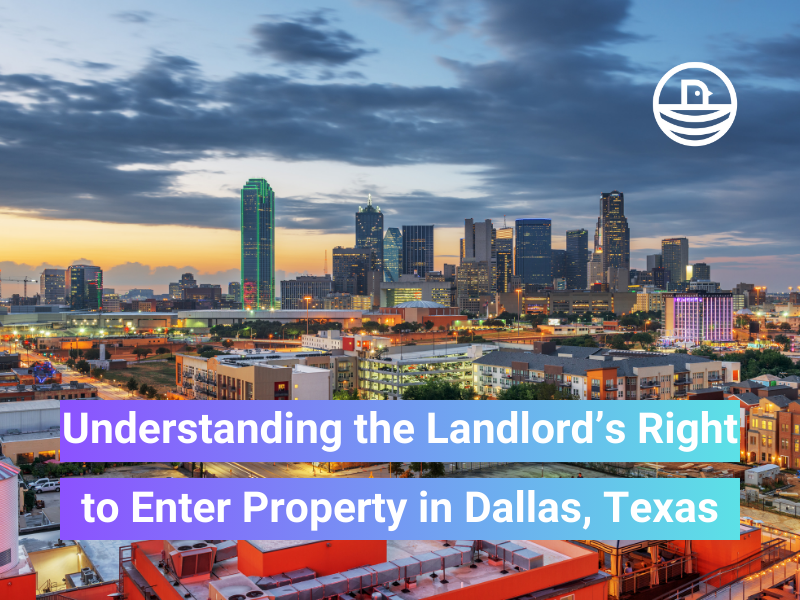Texas is a state that takes pride in protecting the rights of its residents. This includes both tenants and landlords. If you’re a landlord in Dallas, Texas, it’s important to know when you can legally enter your rental property while it’s occupied. Many landlords think that if a tenant asks for repairs, they can go into the home whenever they want—but this isn’t always true. The landlord’s right to enter depends on what’s written in the lease agreement and whether it follows the Tenant Privacy Law. Following these rules can help you avoid problems and maintain a positive relationship with your tenants.
Texas Tenant Privacy Law: What Landlords Need to Know
In Dallas, Texas, the Tenant Privacy Law is clear. As a landlord, you can’t enter the property unless you have explicit permission from the tenant or your lease agreement gives you access. The Tenant Privacy Law covers things like routine inspections and emergency repairs, which are common during Dallas winter storms when pipes are prone to bursting. So, even if your tenant requests maintenance, you still need to set a time with them unless the lease agreement gives you automatic entry rights.
For example, if you plan to do an inspection and your tenant says they don’t want you to come inside while they’re home, you have to respect their wishes. However, tenants can’t refuse entry too much. In Dallas, denying access repeatedly could violate the lease agreement and apartment inspection laws.
Tenants also have the right to request that landlords give 24-hour notice before entering. While this isn’t required by law unless stated in the lease agreement, tenants can make this request in writing. Giving advance notice shows respect for your tenant’s privacy and helps avoid misunderstandings about when you can enter your rental property in Dallas.
When Can Dallas Landlords Legally Enter?
.png)
Landlords in Dallas can only enter their rental property when the tenant gives permission or when the lease agreement says they can. The Tenant Privacy Law is strict about this. Many Dallas landlords use the lease agreement template from the Texas Apartment Association (TAA), which lists several reasons landlords may enter a property, such as:
Testing or replacing smoke detectors
Stopping loud noises
Doing pest control
Taking out food if your power is turned off
Preventing wasted utilities
Suppose the lease agreement doesn’t specify the landlord’s right to enter. In this case, they can only do so in certain situations, like making requested repairs, doing routine inspections, posting eviction notices, or handling emergencies.
Remember, simply owning the property doesn’t give you the right to walk in any time you want. If the tenant refuses, and there’s no entry clause in the lease agreement, Dallas landlords have no legal grounds to enter. The consequences of stepping inside anyway can be severe, so make sure you understand your rights and your tenant’s.
What Should Dallas Landlords Put in The Lease Agreement?
To protect yourself from legal issues and avoid awkward situations, make sure your lease agreement is clear about when you can enter your rental property in Dallas. Consider using the TAA’s lease agreement template, which lists all 24 reasons you might need to get into your property while a tenant lives there.
The TAA lease agreement doesn’t require advance notice, but it does require landlords in Dallas to leave a note explaining their reasons for entering if they go inside the property when the tenant isn’t home. If the tenant feels the landlord is entering too many times without notice, they can request, in writing, that they receive a 24-hour notice each time.
If your property has special access needs—like an easement for hunting or fishing—make sure it’s in the lease agreement. In Dallas, these special access needs don’t only apply to rural areas. You might also need to address other situations, like entering to clean a pool or repair a smart home system, both of which are common in homes in Highland Park. In areas with shared driveways, like Oak Cliff, landlords will need to get specific about how and when they’ll be able to enter.
Texas law allows landlords to enter without notice when there is immediate danger to people or property, such as a fire or flooding. With Dallas prone to severe weather events like tornadoes and ice storms, having an emergency clause can be important. While a clause isn’t required, including one in the lease agreement helps ensure everyone is on the same page. Being clear about the landlord’s right to enter can help prevent legal issues and misunderstandings down the road.
When Can a Property Manager in Dallas Enter?
Property managers in Dallas are required to follow the same Tenant Privacy Law as landlords. A property manager acts on behalf of the landlord, so they can only enter the property if they have permission from the tenant or if the lease agreement allows it.
Hiring an experienced property management company like Evernest can ensure everything is done by the book. While you might be confused about the laws in Dallas, these companies understand all the complexities, having helped other landlords for years. They will make sure your lease agreement covers the right to enter, laying out clear guidelines to help you avoid legal troubles with your tenants.
Crafting a Professional Lease with Evernest
As a landlord in Dallas, Texas, it’s important to follow the Tenant Privacy Law and understand the landlord’s right to enter. A solid lease agreement is your best tool to protect you and your tenant.
Keeping up with all the rules can be exhausting, especially when breaking them can lead to big consequences. This is why a property management company like Evernest can be helpful. They ensure your lease agreement follows all the laws, including the Tenant Privacy Law. If you have a rental property in Dallas, working with a property manager can give you peace of mind, knowing that everything from maintenance requests to tenant screening is being cared for correctly.


